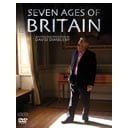
After Rome: The War for Britain
Britain was once part of the Roman Empire from about 50AD to the mid 4th century. By the time the Visogoths sacked Rome towards the end of the 4th century, the physical presence in Britain and most traces of Roman culture and civilization were almost insignificant. So what exactly happened to Britain and its people after the Romans left?
When discussing British history, the period between the 5th until the beginning of the 8th century is popularly called the Dark Ages. Scholars now refer to it as the early Middle ages and the beginning of Britain's Anglo-Saxon period. It is a period shrouded in obscurity, and this three-hour odyssey provides an in-depth exploration of this particular era in time.
Though they left behind a network of walled strongholds across the country, linked by a great highway, the socio-political climate was disorganized and in chaos. As soon as the Roman legions left, Germanic Anglo-Saxon tribes arrived and slowly invaded the islands, meeting little resistance from the native Romano-Britsh citizens. The Anglo-Saxons settled all over the country, forming their little kingdoms. They were, however, in almost constant war with each other in a never-ending cycle of power-grabbing and domination.
At the same time, Bardic tradition rose into prominence, with bards spinning (dubious) tales of heroism within these new kingdoms, supported by just a tiny handful of written sources from historians such as Gildas and the Venerable Bede. However, archaeological findings prove that the 5th to 7th centuries were anything but glorious. Britain had turned into a post-apocalyptic landscape where life was difficult and dangerous.
In 535 AD, the infamous "Year without the Sun" began. A sudden and massive change in climate wreaked havoc across the planet for the next 20 to 30 years. Temperatures rose and dropped; there was drought and famine and thick ash that blocked out the sun and began raining down from the sky. Crops failed, and many people died during a literal "Dark Age." This phenomenon was felt in many countries across the globe and is now attributed to a massive volcanic eruption. And just as things began to get better, a new and deadly disease arrived, one that even killed British Kings. The very first global pandemic and the outbreak of the bubonic plague reached British shores.
Throughout the 600s and 700s, Britain was Christianized, and also experienced some advances in art and architecture. The Britons and Anglo-Saxons began to merge and live side by side with each other. Seven main Anglo-Saxon kingdoms emerged (Northumbria, Mercia, Kent, East Anglia, Essex, Sussex and Wessex) and important non-Anglo-Saxon kingdoms like Rheged. The power struggles also continued, mainly between the larger kingdoms, with King Aethelbert of Kent and King Edwin of Northumbria eventually becoming two of the earliest rulers of most of the islands.
By the 8th century, a new and formidable enemy was on the horizon. The looming Viking invasion became the catalyst for a single and unified English kingdom to come into being.




Great documentary, but WHY is the F....ng music so Bloody LOUD...??-.. It kinda ruin the whole experiance of waching it....!!!
This is literally the most frustrating documentary. Littered with
Same-same drone footage repeated four times back and forth,
the subjects at hand - warring kings, famous castles
and battles between counties, do nothing to connect the dots
and tell us why and how we have the Britain of today
It feels like a cheap narration using stock footage , much of which
is close ups of nature and horses, and other parts a dashcam
footage driving through old towns.
A clutch of independent stories of one battle or other
With side trips to briefly mention European
Plagues and famines, and you have it. I am not
more informed of much after wading through this turgid
Mess of a show.
And there's weird stuff like frequent still photos of whatever
hoard piece they're showing but the still photos are
super blurry and close up.
It's making the whole thing look cheap.
And if they show that drone footage of Galloway one mpre time..
The narration is quite good, however this is going to need quite a lot of editing.
Remember Connections with James Burke, many of the narratives led through the same threads of history, where material was reused, and that made the series more pedagogical because the repetition wasn't incessant, but occurred enough to reinforce memory of events.
I think this would be much better done episodically, in programs of no more than 45 minutes.
its better to enjoy it as an audiobook as the most of the imagery is not relevant or vaguely associative at best..